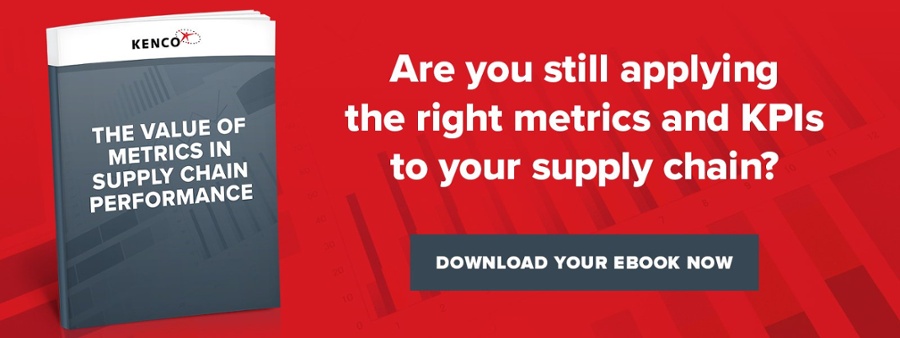Imagine you are shopping for a new car. Your current car is not broken or limping along or anything of that nature, you just saw other drivers with cars that run a little more smoothly, go a little bit faster and cost less at the gas pump.
The more you spot these superior vehicles on the road, the more glaring the differences between your car and those cars seem to become. You want an upgrade, and you are starting to see, hear - and pay for - issues you once just assumed every car had.

Would you pick a new car at random and hope it will perform how you need it to, repeating the process over and over?
Of course not — that would be expensive and waste a lot of time.
You would do your research before car shopping, take a few test drives, and eventually decide on a model that works for your needs.
Supply chain metrics require the same observations, only instead of driving a car purchase, they speak to something far more important: efficiency and a host of abilities that your supply chain needs to survive, such as:
- Sustainability
- Profitability
- Scalability
Metrics give you a top down view of both your past performance and current supply chain state. They can also help you structure the "what-if" scenarios that lead to smarter choices in vendors, third party logistics partners, and even facility operation schedules.
Assembling data on demand is incredibly time-consuming, which is why it is important to have a system in place that automatically records metrics, whenever possible. The sooner the recording method is in place, the more versatile and informative your data becomes.
Then it is important to take the time to understand your data BEFORE you analyze it. Knowing the data well will help you draw sound conclusions later.
Metrics Tell You What Is Not Working
While a lot of the benefits of supply chain metrics point to forward-looking decisions, the truth is, even tried-and-true methods occasionally fail the test of time. The pressures of "the way we have always done it" can interfere with getting unanimous C-suite level support, but metrics give you a neutral resource that demonstrates decreased efficiency - or even skewed ROI - over time. Removing broken processes is as important as introducing optimization when it comes to keeping your supply chain healthy, so make sure you are supporting your efforts with undeniable, logical proof in the form of ongoing data collection.
Removing broken processes is as important as introducing optimization when it comes to keeping your supply chain healthy, so make sure you are supporting your efforts with undeniable, logical proof in the form of ongoing data collection.
Systems are not the only components of a supply chain that could fail to meet expectations: your metrics will help you structure accountability and assignments for facility and supply chain employees. Goals tied to metrics scale seamlessly and thus ensuring clear communication and fair, fact-based enforcement support.
Metrics Provide a Bargaining Chip
Negotiating with vendors - whether discussing a current contract or entertaining a new one - can be a very stressful event. If you come to a negotiation with metrics in hand, however your position, your stance instantly becomes stronger.
Hard data gives you far more leverage to drive down costs or coax more attractive offers from competing supply chain partners, especially when compared to anecdotal complaints or expectations. When you can point to an upward-trending metric and explain you want an X% increase in volume, or a Y% decrease in production time for a component, a vendor will know exactly what is expected of them after the negotiation has ended.
These numbers make future scorecard-style assessments straightforward, as well!
Metrics Help You Get What You Pay For
If your third party logistics provider has promised to deliver certain shipments in a certain timeframe, your metrics can tell you if those promises match up with customer complaints and delivery information. If your rate is contingent upon a certain fulfillment percentage goal, data proving the goal has not been met can earn your company a rate decrease, a refund, or even an early exit from a less-than-beneficial contract.
Agreements, after all, go both ways; ensuring your partners are holding up their end of the deal is just as important as paying your outstanding invoices within term agreements.
Metrics Facilitate Problem Solving
Whether a difficult improvement wish-list crosses your desk or a unique problem threatens your supply chain flow, rest assured metrics will have a hand in the solution. Knowing how variable adjustments affect up-chain and down-chain partners is crucial — it will not help to fix a problem in your facility if the ripples disrupt an important component supplier overseas.
Do not neglect the power of your data when it comes to considering options — the use of metrics when whittling down options and highlighting preferable routes cannot be overstated.
If you are not already gathering metrics for your supply chain, start as soon as possible, or you will risk getting outpaced by a more metrics-savvy rival. A system of recording, assessing and continuous improvement that balances on your metrics will keep everyone in your supply chain on the same page and headaches to a minimum. You have a lot on your plate already, why add guesswork to your to-do list?
For more information how metrics can add value to your supply chain, check out our eBook.
Numbers run business, and they can help run your supply chain too. Make sure your operations planning team is making room for them in reports, meetings, and goal-setting communications.
You might be surprised at what metrics can do for you!



